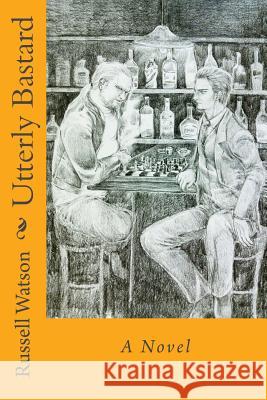Utterly Bastard » książka
Utterly Bastard
ISBN-13: 9781533386601 / Angielski / Miękka / 2016 / 246 str.
It all began one evening while Tomas de Burca and Russell Watson, the eventual author of -Utterly Bastard- were happily downing beer after beer. There was nothing so remarkable about that. After all they were in their regular watering hole in Tokyo. Out of the blue, both engaged in a rambling, alcohol-inspired debate about whether evil really existed. Was the Devil evil? Rather, was he perhaps just another guy doing his job with about as little enthusiasm as many other folk have? Maybe he was essentially a product tester, burdened with a thankless role to fulfil day after tediously boring day? He probably even calmly compares notes with God over the results. We concluded that he might actually be a decent person who detests the work he has been tasked with. Out of this grew the first tatty memos written on scraps of tissue paper. That was roughly a year ago. Finally in the late spring it was ready. I had no trouble developing the characters of God or the Devil. The former was based on numerous grumpy old drinkers I had encountered over the years. The latter was not really drawn from anyone specific. I wanted God and especially the Devil to be likable just as I hoped every reader would detest the -bad seed- they create as part of a challenge God hands to the Devil. Crafting a cohesive story line presented me with more of a challenge. Tom continued to dream up an endless stream of supremely twisted plot devices and ever more bizarre surprises. Somehow I managed to work nearly everything he threw at me into the dialogue. -Utterly Bastard- slowly crawled out of the filth all the while adding meat to its bare bones. Later, I learned that the Devil had been given sympathetic treatment in a number of stories. I consciously avoided reading any of them. I wanted to reduce any risk of inadvertently being influenced in order to keep -Bastard- as original as possible. What, we mused, would happen if God decided to upend everything by creating a truly disgusting specimen of humanity and persuading the Devil to tempt him into doing good? How would that pan out? What would God and the Devil actually be like to meet face to face? In this story, we conceived God as being terminally jaded. He was in a rut, reduced to being a hopelessly drunken cynic who drowns his indifference in endless rounds of gin and tonic. Conversely, the Devil is a sensitive and caring soul who rejoices when humanity resists his temptations and would dearly like to do some good in the world. I suppose the story is really a metaphor for people who become trapped into a role that ends up defining them completely. No matter how hard they try they cannot shake off the stereotypes that they have lived with for so long. The first part of the novel details how the Devil tries in vain to mentor the antagonist, Merck. He is a psychopath, -an utterly bastard person- born out of date rape, one that grows up with a veritable cornucopia of physical and psychological shortcomings. Some years pass and the venture is abandoned. Both the Devil and God realize it is imperative to bring down the monster they have created. Rather than simply reducing Merck to a pile of smoking ash they resolve to defeat him by their wits and superior knowledge. Merck proves to be a far more formidable opponent than either of his creators had counted on. He also increasingly threatens the well being of the humans that they live among and each in their way care deeply about.
Zawartość książki może nie spełniać oczekiwań – reklamacje nie obejmują treści, która mogła nie być redakcyjnie ani merytorycznie opracowana.











